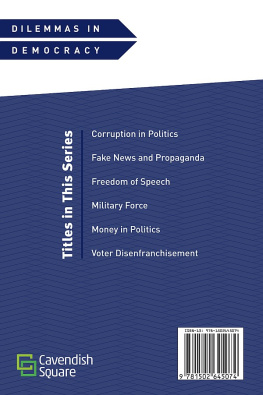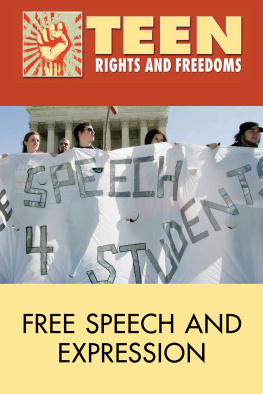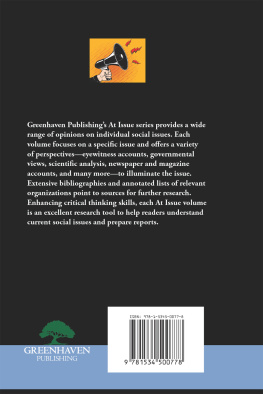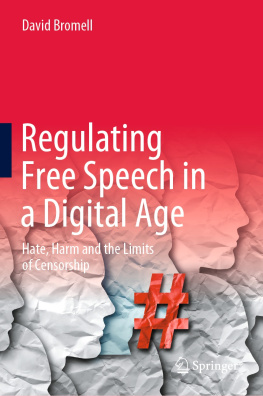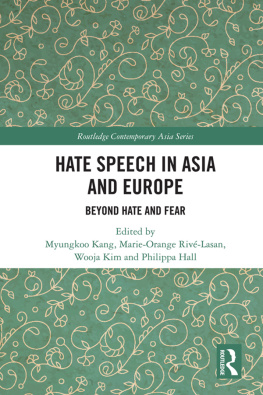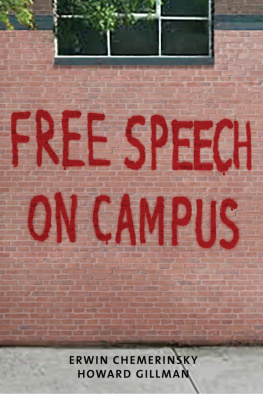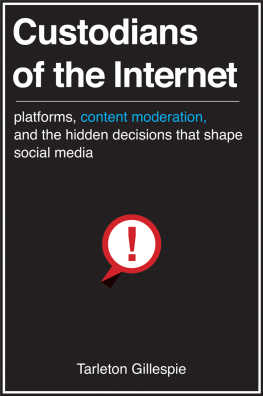Praise for Speech Police
David Kaye has been an outstanding UN Special Rapporteur on freedom of expression, and in this report he pungently distils his findings on one of the most important issues of our time.
Timothy Garton Ash,
author of Free Speech: Ten Principles for a Connected World
Speech Police is an essential primer for understanding the toughest global governance problem of our digital age. The future of human rights and democracy depends on whether the exercise of government and private power across globally networked digital platforms can be constrained and held accountable.
Rebecca MacKinnon,
author of Consent of the Networked
This is an important, timely, and provocative book on a hugely important topic. Everyone interested in free expression and social media should (and will) read it.
Noah Feldman,
Felix Frankfurter Professor, Harvard Law School
In this accessible, urgent volume, Kaye takes us on a whirlwind global tour of social medias sites of impact, from on-the-ground reports of activists in dangerous political climates to the candid conversations behind the closed doors of corporate boardrooms and the halls of government alike. A must-read for anyone invested in the issues this book touches: in other words, all of us.
Sarah Roberts,
Assistant Professor of Information Studies, UCLA
Speech Police doesnt merely surface the key questions surrounding platform governance and content moderation with flair and brevityit also introduces us to the varied people and institutions asking and answering them.
Jonathan Zittrain,
George Bemis professor of international law, Harvard University
Speech Police
The Global Struggle to Govern the Internet
David Kaye
COLUMBIA GLOBAL REPORTS
NEW YORK
Speech Police
The Global Struggle to Govern the Internet
Copyright 2019 by David Kaye
All rights reserved
Published by Columbia Global Reports
91 Claremont Avenue, Suite 515
New York, NY 10027
globalreports.columbia.edu
facebook.com/columbiaglobalreports
@columbiaGR
Library of Congress Control Number: 2019932096
ISBN: 978-0-9997454-8-9
E-book ISBN: 978-9997454-9-6
Book design by Strick&Williams
Map design by Jeffrey L. Ward
Author photograph by Ron Dassa
Creative Commons cover icons (left to right) all courtesy of The Noun Project: Talk Bubble diambergerak, ID; Ear Phones Karen Tyler, GB; Microphone John Caserta, US; Volume by Krishna; Ear Scott Lewis, US
Printed in the United States of America
The Net must offer a place for us, which means it must in a tangible sense belong to us. Anything else, at least with respect to democracy, is hypocrisy.
Benjamin Barber,
Which Technology and Which Democracy? (1998)

CONTENTS
Chapter One
Platform Power
Chapter Two
The Internet Comes to Washington
Chapter Three
Humans and Machines
Chapter Four
Wir schaffen das!
Chapter Five
Choose Your Side
Chapter Six
Arbiters of Truth
Chapter Seven
The Challenge of the Partly Free
Conclusion
Policing Speech in a Centralizing Internet
Introduction
Hossein Derakhshan went to prison with one internet and was released to another.
Derakhshan, known as the Iranian blogfather for his role in making Farsi blogging possible, helped invent Iranian blog culture; his technical insights gave Iranians the tools to use the popular Blogger platform by writing and reading Persian script. A widely read and at times controversial blogger and activist, Derakhshan had been critical of both the Iranian government and foreign threats to overthrow it, and he spent a considerable amount of time in self-imposed exile in Canada and Europe during a productive period of his blogging. During this period, he even visited Israel and wrote about it on his blog. In 2008, just two weeks after returning home to Tehran, the government arrested and then prosecuted Derakhshan for criminal justice system expected, and sentenced to a cruel 19.5 years in jail.
Derakhshan was sent to Evin Prison, Irans infamous detention center for political opponents, journalists foreign and domestic, unlucky visitors, and common criminals. He recalled the moment late in 2014 when he was released. Sipping tea with the dozen other men who shared his cell, he heard the announcement: , the bird of luck has once again sat on one fellow inmates shoulders. Mr. Hossein Derakhshan, as of this moment, you are free.
Derakhshan has become a creative thinker about the culture of information and public debate online, with a perspective that owes something to his imprisonment. Like Rip Van Winkle, upon his release, he was able to reflect clearly on how the internet had changed. In 2008, Iran removed him from a world in which the internet was relatively decentralized, where individual bloggers were still able to influence media consumption. In 2014, it released him into the world of social media.
In blog culture, Derakhshan wrote, ones currency was the hyperlink, the way in which a writer and reader could choose to connect from one story to another. You might be reading one blog, be intrigued in the middle of it by a link to another bloggers ideas, then by a link to a news story, and so on, until suddenly you werent sure how or why you got there. It was distracting but also a remarkable way to feed ones curiosity, a kind of random, limitless exploration of the world of ideas or entertainment or news or whatever you wanted. To be sure, it was moderated; blogs had (and still have) comment sections that could be more or less open to user input. Yet autonomy and expression were the overriding values, text was the medium, and others referred to as the Stream. As Derakhshan explained it:
The Stream means you dont need to open so many websites anymore. You dont need numerous tabs. You dont even need a web browser. You open Twitter or Facebook on your smartphone and dive deep in. The mountain has come to you. Algorithms have picked everything for you. According to what you or your friends have read or seen before, they predict what you might like to see. It feels great not to waste time in finding interesting things on so many websites.
While blogs survived, thrived, or failed in an ecosystem of linking and comment threads, social media depended on the chronologically new and on an emotional credentialing of likes and hearts and retweets, which inevitably morphed into the emojization of reactions. Autonomy and the thrill of randomness gave way to timelines and news feeds driven by opaque algorithms, making us all much less powerful in relation to governments and corporations, as Derakhshan observed. Social media streamlined surveillance and monitoring, making human behavior predictable and controllable, but Derakhshan found being controlled was actually much more frightening than being merely watched.
, just as it is friendlier to censorship, hate speech, disinformation, and propaganda than the horizontal web of blogs and websites. Before the emergence of social media and monopolistic search, hateful propaganda would have had as good a chance of getting a foothold in American culture as a racist John Birch Society pamphlet in 1963which is to say, it would have a following and provoke some discussion and hand-wringing, but a lack of enabling online amplification would not earn it the cultural coin that similar material today has permitted, such as radio host and conspiracy theorist Alex Joness InfoWars website.
Derakhshans insights bring to mind Lawrence Lessigs seminal work, . Lessig, a professor at Harvard, influenced a generation of students, technologists, and lawyers by positing that internet architecture is a form of lawthat code is law. Architecture could protect freedom of expression and, as originally configured, limit the states ability to constrain it:
Next page

